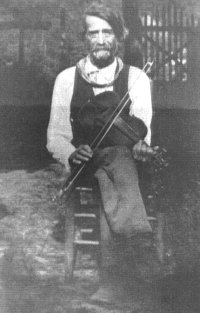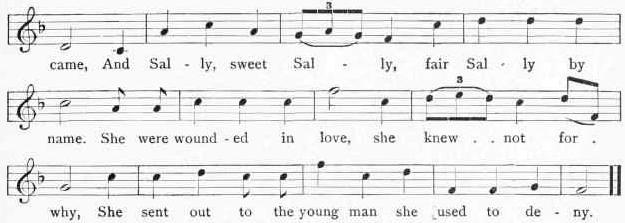Fair Sally- Wallin (NC) 1916 Sharp C
[From English Folk Songs from the Southern Appalachians, Vol 2 by Cecil J. Sharp (1859-1924) and Maud Karpeles; 1932 edition. My title, Sharp used the generic title, The Brown Girl for all versions, no local titles supplied. Sharp called the ballad "Fine Sally" in his field notes referring to Mitchell's version but in fact it was what his half-sister Mary Sands sang. That was probably the local title. Mitchell was a fiddler and was born before the Civil War. Here are some info on Mitchell Wallin and the Wallin family from Wiki:
Members of the Wallin family are either descendants of or married to descendants of Hugh Wallin (1829—1864), a Union Army recruiter assassinated by Confederate soldiers during the U.S. Civil War. Among the children of Hugh and his wife, Rosannah, were sons Mitchell Wallin (1854—1932) and Thomas Jefferson "Tom" Wallin (1857—1948).
One of the first places they visited was Madison County, where they arrived in late July 1916. Sharp met Mary Sands on July 31, and over the next few days collected 25 ballads from her, including "The Silkmerchant's Daughter," "Earl Brand," "The Daemon Lover," and "Sheffield Apprentice." On August 4, Sharp met Sands's half-brother, Mitchell Wallin, who gave Sharp ballads such as "Betsy" and "Early, Early in the Spring" and the fiddle tune "High March." Over subsequent weeks, Sharp collected dozens of ballads from the Wallins' neighbors, namely the Shelton, Gosnell, and Chandler families.
Sharp described Mitchell Wallin as a "bad singer" and a difficult fiddler to notate due to his penchant for improvisation, but considered his visit to Wallin and Sands "fruitful." Years later, Berzilla Wallin said many residents of Madison County were initially suspicious of Sharp, believing that his purpose in the area was to secretly map the region for the construction of a dam and reservoir (and thus require the evictions of hundreds of residents). Others thought Sharp was a German spy. Doug Wallin later said that his grandfather, Tom Wallin— who had become a devout Baptist and disapproved of singing any songs other than hymns— threatened to disown family members if they performed for Sharp. In spite of local skepticism, Madison County proved to be one of the more ballad-rich areas Sharp visited."
Be sure to read Mike Yates article: A Nest of Singing Birds: Cecil Sharp, Mary Sands and the Madison County Song Tradition. Here's an excerpt:
Sharp also noted four songs from Mary’s half-brother, Mitchell Wallin. These were Early, Early in the Spring (which Mitchell called Willie), Betsy, the Thresher’s Daughter, The Broken Token and Fine Sally (The Brown Girl). He also gave Sharp the fiddle tune High March. According to Sharp’s notebook, the song Fine Sally was collected from a Richard Wallin (aged 63), although when printed in Sharp’s Appalachian collection it was attributed to Mitchell Wallin, who was also shown as aged 63. It seems likely that Sharp made a mistake with the name in his field notebook. Mitchell Wallin was the eldest of five brothers - none called Richard. There may have been another relative (a cousin, for example) called Richard Wallin who sang to Sharp, but we have been unable to trace anyone with this name. It was, said Sharp, ‘A very fruitful day on the whole’.
This ballad is not to be confused with the popular ballad, Child No. 73 Lord Thomas and Fair Annet, which is commonly known in the US, and Canada as "The Brown Girl."
US and Canada versions are based on the hundreds of late 18th century English broadsides sometimes titled "The Sailor from Dover" or "Sally and her Truelove Billy."
Child's B version of 295, "The Brown, Brown Girl" collected by Rev. S. Baring-Gould, introduced stanzas from the "Sally and her Truelove Billy" songs. In his article "Folk Song Tradition, Revival and Re-Creation" Steve Gardham has shown that Baring-Gould's ballad is a re-creation of two ballads and not traditional.
To put it simply, the versions are not related to "The Brown Girl" but are part of the "The Sailor from Dover" and "Sally and her Truelove Billy" song group. In the US and Canada some common titles are "Pretty Sally," "Sally," and "A Rich Irish Lady." They have been put here following Bronson and others who have attached them to Child 295, not because they belong here.
R. Matteson 2014]
Notes from Cecil Sharp No. 44. The Brown Girl.
Texts without tunes:— Child's English and Scottish Popular Ballads, No. 295. Gavin Greig's Folk-Song of the North-East, i, art. 79. Broadside by Such, 'Sally and her True Love Billy' Cox's Folk Songs of the South, p. 366 (see also further
references). Journal of American Folk-Lore, xxvii. 73 ; xxxii. 502 ; xxxix. 110.
Texts with tunes: — Christie's Traditional Ballad Airs, ii. 241. Kidson's Garland of English Folk Songs, p. 20. Journal of American Folk-Lore, xviii. 295 (tune only). Journal of the Folk-Song Society, viii. 5. British Ballads from Maine, p. 418.
Davis's Traditional Ballads of Virginia, pp. 537 and 604.
'Colours' (Texts A and B) may be a corruption of 'country' as given in Folk Songs of the South.
Version J is reminiscent of The Death of Queen Jane (No. 32).

Mitchell Wallin; Fiddler
C. [Fair Sally] Sung by Mr. MITCHELL WALLIN at Allanstand, N. C, Aug. 4, 1916; Hexatonic. Mode 3, a.


1 There was from London she came,
And Sally, sweet Sally, fair Sally by name.
She were wounded in love, she knew not why,
She sent out to the young man she used to deny.